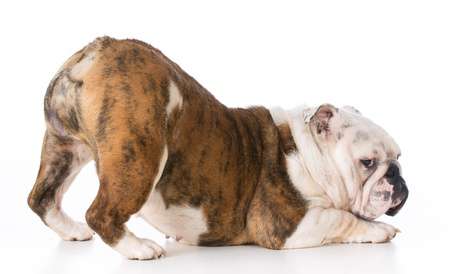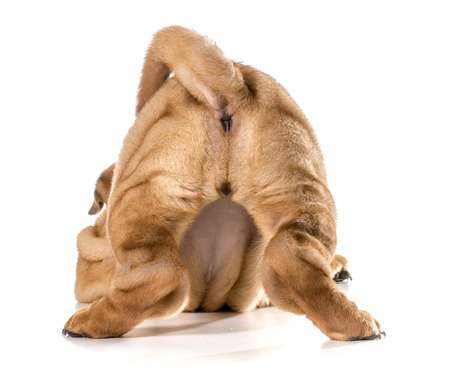One question that north Raleigh veterinarian clinics hear often pertains to dogs scooting. Today we’re going to take a look at the most common answer to this question – anal gland trouble.
North Raleigh Veterinarian Answers: Why is My Dog Scooting?

Dogs can scoot their hind ends on your carpet for a number of reasons, but one of the biggest reasons north Raleigh veterinarian clinics see is anal gland discomfort.
When your dog begins to scoot their bottom on your carpet, most commonly the anal glands are full and your dog is not expressing them naturally. Full anal glands can be very uncomfortable for your dog and cause them to scoot their hind end on your carpet in an effort to relieve that discomfort.
North Raleigh Veterinarian Answers: What Are the Anal Glands?
Dogs have two small grape-sized glands on either side of their anus. These glands contain a very potent smelling substance that dogs utilize to communicate with each other. Most of the time the substance in your dog’s anal glands will express naturally when they go to the bathroom, but occasionally (especially in the case of dogs experiencing frequent diarrhea) the anal glands do not express naturally. This lack of expression causes the glands to become full or even abscessed.
North Raleigh Veterinarian Answers: What Should You Do?
If your dog has full anal glands, your vet will express them by gently squeezing them to release the odorous substance inside. Full anal glands are often referred to as impacted anal glands. If you don’t have your dog’s anal glands expressed when they are impacted your dog will continue to scoot their bottom on your carpet and it will become painful and uncomfortable for them to go to the bathroom. Another serious complication that results from a failure to have full anal glands expressed is that there is a very high possibility that your dog will develop an anal gland infection. When your dog has an anal gland infection their glands will become swollen, red, and very uncomfortable for your dog. Anal gland infections require treatment with antibiotics. If antibiotics are not given in time, the anal glands can actually rupture as a result of the infection.
When the anal glands rupture due to infection this is referred to as an anal gland abscess. An anal gland abscess is extremely uncomfortable for your dog and not very pleasant for you either. An abscessed anal gland will leak blood, pus, and anal gland contents. It is EXTREMELY important that if your dog experiences an abscessed anal gland, you get them to the vet immediately. When treating an abscessed anal gland your vet will need to sedate your dog, cut open and drain the abscessed gland, apply antibiotics, and close the wound. Your dog will also receive oral antibiotics to help to control the infection.

North Raleigh Veterinarian Answers: What Signs Should You Watch For?
Once you have experienced an anal gland incident with your dog, the chances are that you will become much more aware that these little glands exist and sometimes require veterinary attention.
Soft Stools
If you notice that your dog has had particularly soft stools for a while you want to address the cause of soft stools and rectify it, but you should also monitor your dog’s behavior to look for any signs of anal gland impaction such as scooting on the carpet, reluctance to use the bathroom, discomfort when using the bathroom, or constant licking or biting at the rear end.
Odor
If your dog has a somewhat fishy odor coming from their rear end, it could be a sign that their anal glands need expressing.[/accordion]
Scooting, Licking, and Bathroom Trouble
If your dog begins showing any of the symptoms listed in our first bullet point, you should take them into your veterinarian to have their anal glands checked out.North Raleigh Veterinarian Discusses Anal Gland Problem Prevention
Once your dog has had an anal gland abscess they are more likely to need a veterinary expression of their anal glands in the future. There are some things that you can do, however, that can help your dogs anal glands to express naturally.
Address Soft Stools
Address soft stools and diarrhea. Firm normal stools are what naturally cause anal gland expression, softer stools do not have this effect so it is important for your dog’s anal gland health that soft stools or diarrhea are treated as soon as possible. Not to mention that these types of stools can be a sign that something is wrong.
Adding Fiber
If you find that your dog has consistent trouble with their anal glands, ask your vet whether adding more fiber to your pet’s diet would be a good idea.
Address Your Dogs Diet
If your dog has consistent trouble with their anal glands, discuss your pet’s current food with your vet to see if you can identify if their diet is contributing to their trouble.
Address Symptoms Quickly
If you begin to notice any signs of anal gland fullness or infection, visit your veterinarian immediately to prevent an infection from developing or an existing infection from abscessing.
Only Trust Professionals
Unless your dog has experienced difficulty with their anal glands already, keep your hands (and your groomers hands) off your dog’s anal glands! These glands are usually quite self-sufficient, but if you constantly have them emptied manually this can affect their ability to function normally. It is also important to note that anal glands are very delicate glands and allowing someone without adequate knowledge to express these glands can cause permanent damage.
Questions For Your North Raleigh Veterinarian?
Do you have questions about your dogs anal glands? Give us a call and set up an appointment with one of our vets to discuss your questions!
(919) 887-8808

